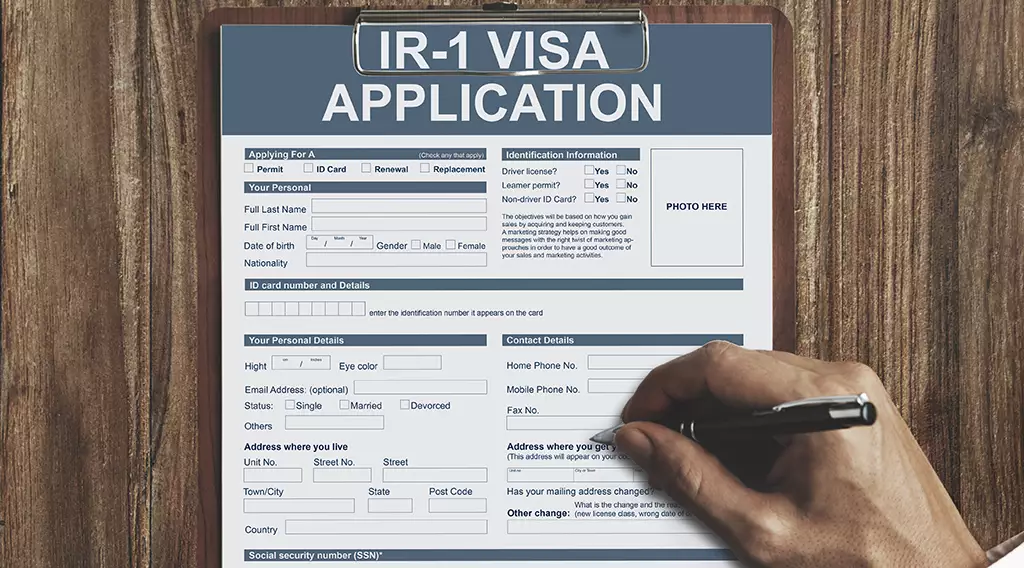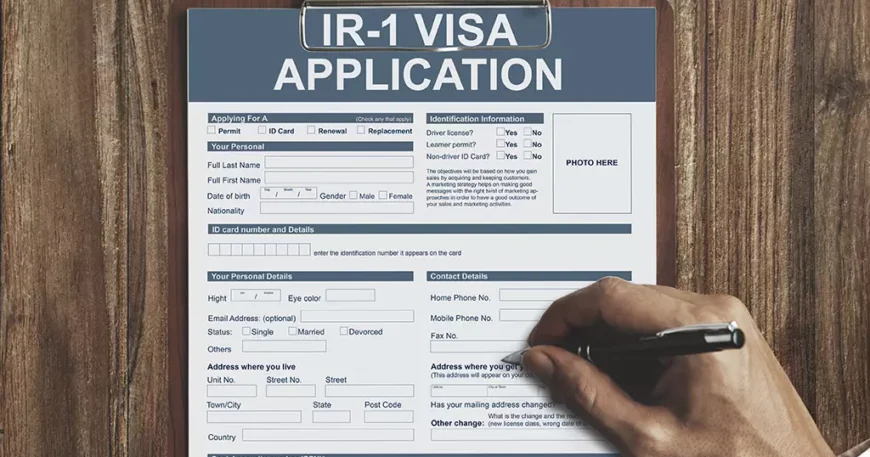What is an IR1 Visa?
The IR-1 visa (Immediate Relative Visa) is a U.S. immigrant visa designed for the spouse of a U.S. citizen who has been married for at least two years. It allows the foreign spouse to enter the U.S. as a lawful permanent resident (green card holder).
The IR-1 category differs from the CR1 visa (Conditional Resident Visa), which is issued when the couple has been married less than two years at the time of approval.
Once approved, the IR-1 visa grants the spouse unconditional permanent residency — no need to remove conditions after two years, as required under the CR1.

Why Choose the IR-1 Visa?
There are many family-based immigration options, but the IR-1 visa offers significant advantages:
-
Permanent Residency Upon Entry – Unlike other visas, you immediately receive a 10-year green card.
-
No Annual Quotas – IR-1 visas are not subject to numerical limits, meaning faster processing.
-
Path to Citizenship – After three years as a green card holder married to a U.S. citizen, you may apply for naturalization.
-
Work Authorization Included – You can work legally in the U.S. as soon as you arrive.
-
Travel Freedom – Enjoy unrestricted travel in and out of the U.S.
The IR-1 visa provides stability and security for spouses who plan to build their life together in the United States.
Eligibility Requirements for the IR-1 Visa
To qualify for the IR-1 visa, both spouses must meet specific eligibility requirements:
-
The petitioner must be a U.S. citizen.
-
The marriage must be legally valid in the country where it took place.
-
The marriage must be bona fide (real), not solely for immigration purposes.
-
The U.S. citizen spouse must be at least 18 years old.
-
The petitioner must have financial means to support the immigrant spouse (Form I-864, Affidavit of Support).
Any falsified marriage or incomplete documentation can lead to an IR-1 visa denial — or worse, permanent immigration ineligibility.
Step-by-Step Process to Apply for an IR-1 Visa
Applying for the IR-1 visa involves several key steps. Here’s a breakdown:
Step 1: File Form I-130 (Petition for Alien Relative)
The U.S. citizen spouse must file Form I-130 with USCIS to establish the marriage relationship. Once approved, the case moves to the National Visa Center (NVC).
Step 2: Submit Supporting Documents
The NVC will request key documents such as:
-
Marriage certificate
-
Birth certificates
-
Divorce or death certificates (if applicable)
-
Passport copies
-
Financial evidence (Form I-864)
-
Police clearance certificates
Step 3: Pay Required Fees
You’ll pay both the USCIS filing fee and the NVC visa processing fee.
Step 4: Attend the Visa Interview
The foreign spouse attends an interview at the U.S. embassy or consulate in their country. They must answer questions about the marriage and relationship.
Step 5: Receive the IR-1 Visa and Travel
Once approved, the IR-1 visa is placed in the passport. Upon entry to the U.S., the foreign spouse automatically becomes a lawful permanent resident.
IR-1 Visa Processing Time
Processing times vary depending on factors such as embassy workload, background checks, and country of origin. On average:
-
I-130 Petition Approval: 7–12 months
-
NVC Processing: 3–6 months
-
Interview Scheduling: 1–2 months
Total estimated time: 10–18 months
However, since IR-1 visas are not limited by yearly quotas, they generally move faster than other immigrant visa types.
Documents Required for IR1 Visa
Here’s a checklist of essential documents to prepare for your IR-1 visa interview:
| Document Type | Description |
|---|---|
| Passport | Must be valid for at least six months beyond entry date |
| Marriage Certificate | Proof of a legally recognized marriage |
| Photos | U.S. visa-style photos of both spouses |
| Birth Certificates | For both spouses |
| Police Certificates | From all countries where you’ve lived since age 16 |
| Medical Examination Report | From an authorized physician |
| Form I-864 | Affidavit of Support from the U.S. spouse |
| Proof of Relationship | Photos, emails, financial records, etc. |
Keeping these documents ready ensures your IR-1 visa application moves forward without unnecessary delays.
Common Mistakes That Cause IR-1 Visa Delays
Even the smallest error can cause long delays or denials. Avoid these common mistakes:
-
Incomplete Forms – Missing signatures or unchecked boxes are frequent causes of rejection.
-
Inconsistent Information – Conflicting dates or names between forms and documents raise red flags.
-
Lack of Proof of Genuine Relationship – Failure to show evidence like photos, joint bank accounts, or communication history.
-
Unpaid Fees – Missing or incorrect payments can halt processing.
-
Poor Interview Preparation – Unconvincing answers may make officers doubt the marriage’s legitimacy.
Syed Professional Services helps applicants avoid these costly mistakes through personalized document review and interview coaching.
IR1 Visa vs. CR1 Visa: What’s the Difference?
| Feature | IR-1 Visa | CR1 Visa |
|---|---|---|
| Marriage Duration | Over 2 years | Less than 2 years |
| Green Card Validity | 10 years (permanent) | 2 years (conditional) |
| Need to Remove Conditions? | No | Yes, after 2 years |
| Processing Time | Slightly faster | Slightly longer |
| Ideal For | Established marriages | Newly married couples |
Choosing between the IR-1 visa and CR1 visa depends on how long you’ve been married at the time of application.
Benefits of Hiring a Professional Immigration Service
The IR-1 visa process can be complex, especially for couples living in different countries. That’s where Syed Professional Services comes in.
Our immigration experts provide:
-
Step-by-step case management
-
Document verification and review
-
Assistance with USCIS and NVC submissions
-
Interview preparation
Working with an experienced professional minimizes the risk of IR-1 visa delays and denials — and gives you peace of mind.
Top Tips for a Successful IR1 Visa Interview
-
Be Honest and Consistent – Never provide false information.
-
Bring Original Documents – Photocopies alone may not be accepted.
-
Know Your Relationship Details – Be ready for questions about dates, habits, and family.
-
Dress Professionally – First impressions matter.
-
Show Confidence – Nervousness can be mistaken for dishonesty.
Proper preparation helps your IR-1 visa interview go smoothly and efficiently.
FAQs About the IR1 Visa
1. What does IR-1 stand for?
IR1 stands for Immediate Relative (Spouse of a U.S. citizen) immigrant visa.
2. How long is the IR1 visa valid?
The IR-1 visa provides immediate permanent residency, valid for 10 years, renewable indefinitely.
3. Can I work in the U.S. on an IR-1 visa?
Yes, you can legally work as soon as you arrive since the IR-1 visa grants green card status upon entry.
4. What happens if my IR1 visa expires before traveling?
You’ll need to contact the embassy for reissuance. Avoid travel
5. What Happens After You Arrive in the U.S. on an IR1 Visa
Congratulations — you’ve arrived! Once you enter the U.S. with your IR-1 visa, you’re officially a lawful permanent resident.
Here’s what to expect:
-
Green Card Delivery: You’ll receive your 10-year green card by mail within 2–4 weeks.
-
Social Security Number (SSN): You can apply immediately or wait for it to arrive automatically.
-
Employment Rights: You’re authorized to work without needing an Employment Authorization Document (EAD).
-
Travel: You can freely enter and leave the U.S., but avoid staying abroad for over 6 months consecutively.
-
Path to Citizenship: After 3 years of marriage and U.S. residence, you can apply for naturalization.
The IR-1 visa not only reunites families but also offers long-term stability for your future.
6. What If Your IR1 Visa Is Denied?
Visa denials can happen — but understanding why is key to appealing or reapplying successfully.
Common Reasons for IR-1 Visa Denial:
-
Insufficient evidence of a bona fide marriage
-
Missing or incomplete documentation
-
Ineligibility due to criminal records or immigration violations
-
Financial ineligibility under Form I-864
-
Inconsistent interview answers
If denied, you’ll receive a written notice explaining the reason. You can appeal the decision or reapply with stronger evidence.
At Syed Professional Services, we specialize in denial reviews and reapplication assistance for IR-1 visa cases that need expert guidance.
7. Timeline to U.S. Citizenship After IR1 Visa
Your journey doesn’t end with the IR-1 visa — it begins there.
Here’s the path to becoming a U.S. citizen:
-
Obtain IR-1 Visa → Green Card (valid for 10 years)
-
Live in the U.S. continuously for 3 years as the spouse of a U.S. citizen
-
Apply for Naturalization (Form N-400)
-
Pass Civics and English Test
-
Take Oath of Allegiance
You’ll then officially become a U.S. citizen, eligible for a passport, voting rights, and full protection under U.S. law.
8. Tips from Immigration Experts at Syed Professional Services
We’ve helped hundreds of couples through the IR-1 visa process — and here’s what we’ve learned:
✅ Start Early: Paperwork takes months, so begin at least a year before your target move date.
✅ Organize Everything: Keep digital and physical folders for every document.
✅ Be Transparent: Honesty is key in all visa applications.
✅ Communicate Frequently: Regularly check email updates from USCIS and NVC.
✅ Seek Professional Help: Even minor errors can lead to major delays.
Our experienced team ensures your IR-1 visa journey is efficient, accurate, and stress-free.
9. Real-Life IR1 Visa Success Story
At Syed Professional Services, we recently helped Sara (Pakistan) and James (Texas) reunite through an IR-1 visa application.
They faced delays due to missing documents and translation errors, but our experts helped them:
-
Correct their I-130 petition
-
Organize complete financial documentation
-
Prepare for the consular interview
Their visa was approved within 11 months. Today, Sara is a permanent resident, working and living in Dallas, Texas.
Stories like these show how the IR-1 visa can truly change lives when handled professionally.
10. Maintaining Your IR1 Status
To maintain your IR-1 visa (and green card) status:
-
Live in the U.S. for most of each year
-
Avoid criminal offenses or immigration fraud
-
File taxes annually as a resident
-
Notify USCIS of any address changes
-
Renew your green card before it expires (every 10 years)
Neglecting these steps can lead to complications or loss of status — something easily avoided with proper guidance.
11. Common IR1 Visa Myths Debunked
| Myth | Reality |
|---|---|
| “The IR-1 visa is faster if we pay more.” | No — processing times are based on USCIS and NVC workloads, not payment speed. |
| “We don’t need to show proof of relationship.” | False — photos, messages, and travel records are essential. |
| “I can work before entering the U.S.” | Not true — work authorization begins only after entry. |
| “Marriage in another country doesn’t count.” | As long as it’s legally valid, it qualifies for IR1. |
Knowing the truth helps prevent unnecessary mistakes during your IR-1 visa journey.
Additional FAQs About IR1 Visa
7. Can my children come with me under my IR1 visa?
No, children must have separate IR2 visa applications.
8. What if my U.S. spouse lives abroad with me?
That’s fine — but your spouse must prove intent to reestablish domicile in the U.S. before you move.
9. Can I renew my IR1 visa?
The IR-1 visa itself doesn’t need renewal — once you enter, you receive a 10-year green card.
10. What happens if we divorce after I receive my IR1 visa?
You’ll still retain your permanent resident status, but it may affect your future naturalization timeline.
11. Can I change my name after getting an IR1 visa?
Yes, you can update your records with USCIS after legally changing your name.
12. Why Choose Syed Professional Services for Your IR1 Visa Application
Navigating the immigration system can feel intimidating — but Syed Professional Services is here to simplify the process for you.
We provide:
-
Personalized Immigration Consultations
-
Expert Document Review
-
Form Preparation Assistance
-
Case Progress Monitoring
-
Interview Coaching
With a deep understanding of U.S. immigration laws and years




